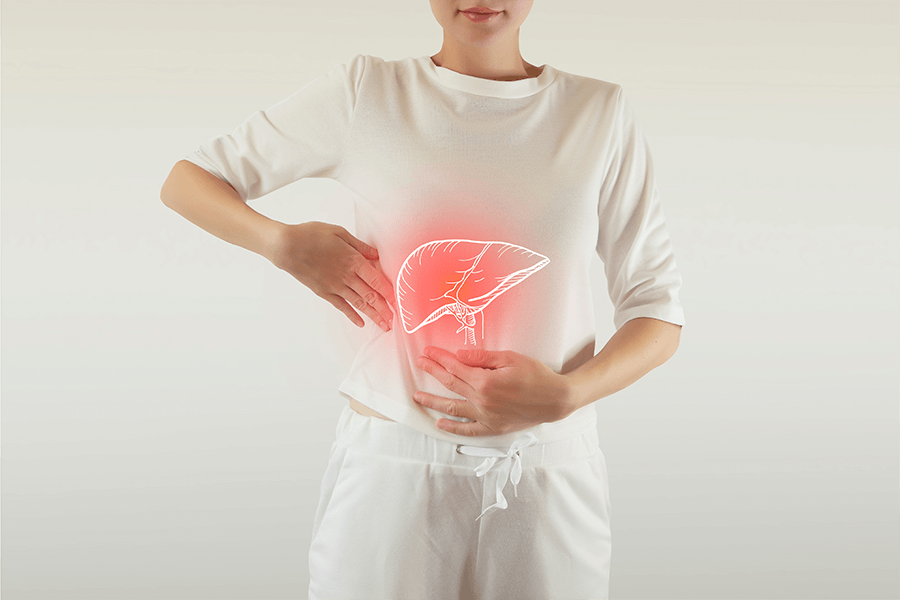FibroScan® in Denver, CO
What is FibroScan?
FibroScan is a test used by Denver Digestive Health Specialists GI providers to review the liver noninvasively. Also known as transient elastography, the scan uses a particular ultrasound machine to determine the occurrence of fibrosis and steatosis in the liver. Fibrosis occurs when the liver substitutes sound tissue with scar tissue to heal itself from an underlying condition. Hepatic steatosis is also referred to as fatty change and arises when fat builds up inside the liver cells.
Using FibroScan, your Denver, CO gastrointestinal physicians may analyze the condition and function of your liver and make a diagnosis and medical plan without intrusively probing the body to review the liver. If you have a liver condition, please request a consultation with Denver Digestive Health Specialists to learn if you may find value in FibroScan ultrasound technology.

Who is a good candidate for FibroScan?
FibroScan testing might be recommended for clients with early to advanced liver disease or other situations. These could include:
- different types of chronic liver disease
- Hemochromatosis
- Particular types of hepatitis
- Cirrhosis of the liver (harsh scarring)
- PBC or primary biliary cholangitis
- Syndrome X (insulin resistance syndrome)
- Alcoholic fatty liver disease
- NASH or nonalcoholic steatohepatitis
How is FibroScan conducted?
A FibroScan examination in Denver, CO is usually an easy procedure performed in 10 – 15 minutes. A sensor will be put on your skin over your liver. This specific detector transmits acoustic sound waves through your liver to measure the speed at which sound travels through the organ. The FibroScan system then produces a set of results that your Denver Digestive Health Specialists GI providers will analyze to quantify the degree of hardness (fibrosis) inside your liver.
How do you understand and interpret FibroScan results?
FibroScan results are given according to fatty liver disease grade of severity and fibrosis score. The following charts consist of common details regarding what the scan results could demonstrate. It would help if you discussed your results, specifically, with your Denver Digestive Health Specialists GI specialists after your FibroScan test.
Steatosis grade: The steatosis result explains the level of fatty change in the liver and is provided by way of a CAP score (controlled attenuation parameter), which is evaluated in dB/m (decibels per meter). The reach is from 100 to 400 dB/m, and assorted ranges contribute to a different fatty liver grade.
Fibrosis score: The fibrosis result is an assessment of the hardness of the liver and symbolizes the level of scarring that the liver has experienced. Your gastrointestinal specialists will utilize your FibroScan findings and your medical history to determine your fibrosis value. Various liver diseases and diseases can affect the fibrosis score.
- F0 to F1: void of scarring/light scarring
- F2: medium scarring
- F3: severe scarring
- F4: extremely progressive scarring (cirrhosis)
What are the advantages of FibroScan?
Because FibroScan uses ultrasound technology, there is very little to no threat correlated with the procedure. FibroScan is a non-invasive ultrasound method. It allows for a broader check of the whole liver instead of an examination of only a minor portion like what is done in a liver biopsy. Also, no sedation medication is vital for the therapy; it is inexpensive, swiftly accomplished, and the outcomes are prompt.

Specialized treatment
for liver conditions
FibroScan® FAQs
How do I prepare for a FibroScan test?
You shouldn’t eat or drink anything in the three hours leading up to your FibroScan test, although it is okay to continue taking your prescribed medications. Our GI specialists recommend that you wear loose clothes so we have easy access to the right of your ribcage. Our staff will go over preparation details with you before your exam in order to make sure you know exactly what to expect with a FibroScan test.
What liver conditions will FibroScan monitor?
The FibroScan test can detect and monitor a range of diseases of the liver, including:
- Nonalcoholic fatty liver disease (NAFLD)
- Alcoholic liver disease
- NASH (non-alcoholic steatohepatitis)
- Hepatitis B and C
- Hemochromatosis
What is the difference between an ultrasound and the FibroScan?
The FibroScan test is a form of ultrasound and uses the exact same technology a standard ultrasound will use, known as transient elastography. And while they are very similar, FibroScan was invented to measure how stiff the liver is and is more sensitive to picking up liver issues than a normal ultrasound.
Is FibroScan more advanced than a liver biopsy?
The FibroScan is a nonsurgical alternative to a liver biopsy. It should be noted, however, there are sometimes certain situations in which a biopsy of the liver might be preferred. This may be the case for a patient who has a pacemaker or defibrillator, is pregnant, or has fluid in the abdomen. Additionally, results could become incorrect in people who are morbidly obese. Keeping all of this in mind, our Denver Digestive Health Specialists team will closely work alongside you to help you decide if a FibroScan exam or a traditional liver biopsy is the right option for you.